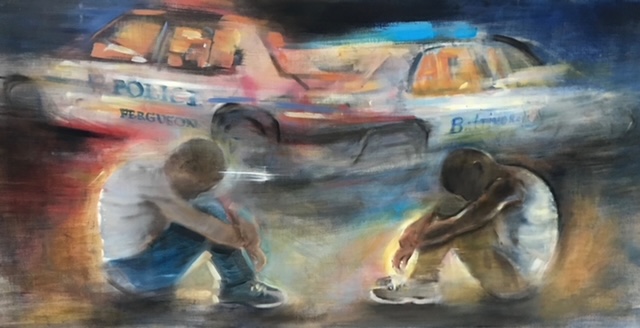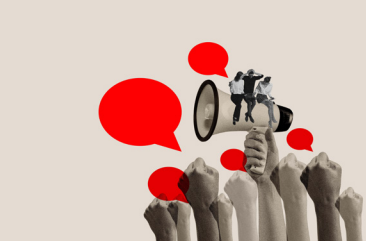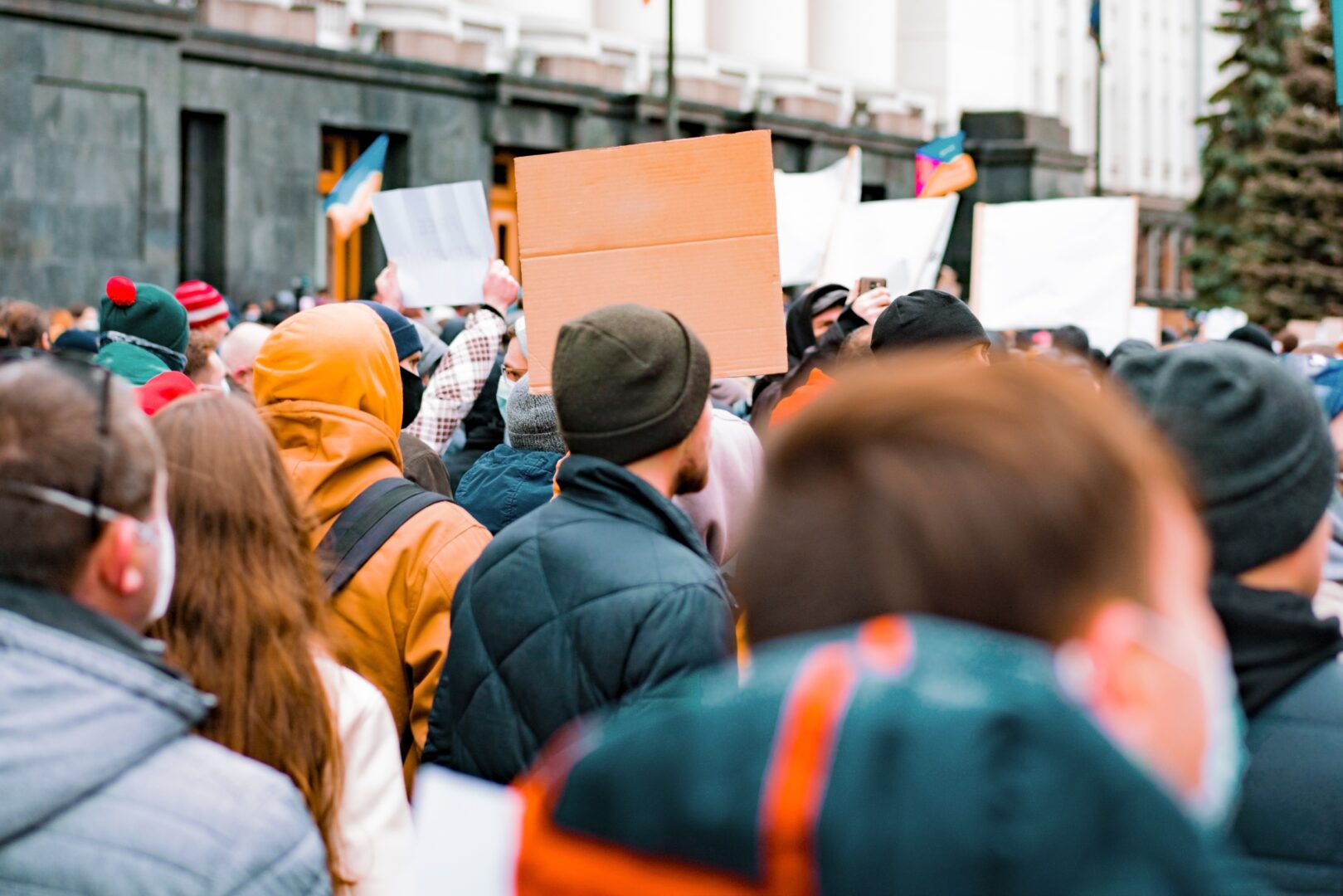On September 24, 2001, President George W. Bush announced an executive order expanding the Department of the Treasury’s authority to freeze the assets of any non-profit organization designated as a “terror” entity. The move – overly broad, steeped in anti-Muslim bias and lacking in basic due process mechanisms – signaled a pattern of cynical tactics, secret evidence and opaque procedures used to stifle Muslim non-profit organizations for years to come. All told, about 30 Muslim relief organizations were targeted – some were abruptly shut down and others closed under the weight of shrinking donor pools.
Today, we find ourselves at a similar inflection point with unrelenting federal and philanthropic scrutiny and the suppression of Black, African, Arab, Middle Eastern, Muslim and South Asian (BAMEMSA) organizations advocating for Palestinian human rights in the U.S. and abroad. But today, we must take a different path – the very existence of our social movements and our democracy demands it.
Social Justice Movements: The 5th Estate
Non-profit organizations that make up our social justice movements are an immutable part of our democracy, acting as a de facto 5th estate. They hold our government accountable, advocate for policy changes, change hearts and minds, and ensure that those who are marginalized have the opportunity to build and assert their power.
At their best, our movements embody our democratic ideals of transparency, justice and equity, holding a mirror to our society and demanding better for us all. In fact, it has always been “We the People” through the vehicle of our movements that have forced change, shaped our democracy and pushed beyond our societal comforts toward lasting justice. The path to justice has always been winding – even elusive – and those in power have too often served as obstacles rather than guides. It is through our movements holding steadfast and pushing our country toward our ideals that we have learned that backlash is often a tool to impede our progress. Similarly, as Palestinian human rights voices that make up our movements suffer the return of McCarthy Era tactics that target them with harsh consequences because of their political affiliations, identity, the communities they serve or the issues they support, it is not just these organizations that suffer – our entire social justice movement and consequently the very foundation of our participatory democracy is made more vulnerable.
Yesterday’s Tactics, Today’s Fight
BAMEMSA movements and allies are facing intense scrutiny. Politically motivated investigations, congressional witch hunts, unchallenged media narratives, funder retrenchment, physical and digital threats and attacks, and baseless lawsuits have reemerged as the norm. These tactics are not new. The United States has had a long history of using federal investigations and financing laws to suppress Palestinian solidarity activists. The Center for Constitutional Rights (CCR) and Palestine Legal document this in a recent white paper, noting that the first mention of “terrorism” in a federal statute appeared in 1969 after the 1967 war between Israel and a coalition of Arab armies and was aimed at restricting humanitarian aid to Palestinians, thus equating Palestinians and relief efforts with terrorism.
Whether in 1969, 2001 or today, the goals have been transparent – bleed these organizations dry, raise the specter of fear and suspicion to isolate them from broader social justice movements and philanthropy, and limit their ability to advocate effectively for the issues they care about – namely Palestinian human rights. While the attacks are numerous, a few are particularly insidious:
Revoking Nonprofit Status: The House passed bipartisan legislation (H.R. 6408/ S.4136) empowering the Treasury Department to shut down nonprofits under the value label of “terror-supporting,” echoing and expanding the Bush administration’s 2001 executive order. Many RISE Together Fund (RTF) grantees and partners are pushing back against this legislation recognizing that if it becomes law, it will be used to also target political foes on issues such as abortion, climate change, police accountability and LGBTQ rights. As Kia Hamadanchy, senior policy counsel at the American Civil Liberties Union, put it, “You’ve basically left a loaded gun on the table,” with the implication that it can be used indiscriminately in the hands of authoritarians interested in consolidating power and eliminating critics.
Questionable Congressional Actions: Earlier this year, the House Oversight and Education and Workforce Committee chairs demanded that the Treasury Department provide Suspicious Activity Reports (SARs) for 20 nonprofits and funders – some loosely or erroneously – linked to Palestinian solidarity efforts on university campuses. The Suspicious Activity Reports are not evidence of a crime. Similarly, and using the same list of organizations, another legislator demanded all correspondence between these organizations and the State Department, while a group of 16 legislators sent a letter to the Internal Revenue Service requesting an investigation of several Palestinian solidarity organizations. Even former House Speaker Nancy Pelosi got into the mix calling on the FBI to investigate pro-Palestinian protesters. The naked motivation of each of these efforts is to push an unsubstantiated and dangerous narrative that protests, advocacy and funding for Palestinian solidarity is not connected to organic community-led movements, but instead to foreign influences.
Strategic Lawsuits Against Public Participation and Politically Motivated Investigations: Some groups have been persistently smeared by local, state and federal authorities. In October 2023, the Virginia Attorney General Jason Miyares announced a far-reaching investigation into American Muslims for Palestine, a United States–based Palestine solidarity group. Soon after, several civil lawsuits by private citizens were filed that baselessly called U.S. non-profit organizations propaganda divisions of Hamas. While many of these tactics have failed to result in judgements in the past, the goal is to push organizations to divert their time, energy and funds to defend against baseless allegations and impede their activities into the future.
Inappropriate Funding Behavior
Yet, these political attacks are not the full story. For months, many movement organizations and some funders have sounded alarm bells to concerning funder behaviors or as a coalition of Jewish donors and philanthropy professionals have described it: “The harmful practice of withdrawing funding for and/or delaying payments to organizations that speak up for the lives and safety of the Palestinian people.” The undue pressure from philanthropy not only compromises the independence of nonprofits but also weakens our broader social justice movement by creating divisions, limiting the scope of advocacy and often working against the foundation’s own goals of strengthening our democracy.
In one egregious example, a field leader shared that a private foundation questioned whether it would be prudent to give a large grant toward non-partisan civic engagement activities led by an Arab-American organization given community anger over the current administration’s policy position on the violence in Gaza. The implication being that the increased political participation of Arab Americans would be harmful to securing electoral wins for democratic candidates. Make no mistake, under resourcing organizations that are often the only connection communities have to the polls has the effect of suppressing Arab-American turnout. Not only is this questioning and potential impact wholly inappropriate and abusive, but it also goes against every principle we hold dear as funders committed to the inclusion of historically marginalized communities in the electorate and consequently a robust participatory democracy.
For the RISE Together Fund, many of our grantees have experienced canceled and shrinking grants for their United States–based Palestine solidarity efforts. Some have lost funding for personal social media posts. Others have experienced intense questioning, pressure to denounce campus protests or risk grant renewals, and at least 1 of our grantees is anticipating an 80% drop in institutional funding next year. These examples on their own evoke images of a field under pressure, however alongside a history of chronic underfunding, we find ourselves at a crisis point. In 2022, RTF and a team of researchers – including partners from NCRP – embarked on a research project to quantify resource mobilization for BAMEMSA causes in the United States. While the study itself was challenging due to the dearth of data, lack of disaggregation when it did exist, and inconsistent data categorization across philanthropy, the conclusions were unsurprising: 1) Despite BAMEMSA communities growing rapidly and their canary in the coalmine status within social justice movements, they remain chronically underfunded. In fact, for every $100 spent by social justice philanthropy, only about $1 is being spent in BAMEMSA movements. 2) BAMEMSA movements are not just under-resourced, they are also outspent on 2 fronts: by an active network within philanthropy that specifically funds anti-Muslim projects, personalities, and propaganda; and by federal government funding to programs and initiatives that harm BAMEMSA communities under the guise of “national security.” Anti-BAMEMSA forces outspent BAMEMSA movements by at least 5 to 1.
Choosing A Different Path
These tactics together are being used to exploit fault lines within our social justice movements, creating fissures that will ultimately slow progress. They are a part of a larger pattern of authoritarian strategies used to silence dissent. In the past decade, the government has undercut progressive activists and movements using the full force of the law across the country. For instance, anti-boycott legislation intended to quell Palestinian solidarity boycotts is being copied to stop states from doing business with those who divest from fossil fuels undermining key climate justice efforts. Legislators in more than 20 states have significantly enhanced penalties for some protesters, including those challenging Cop City, have been charged with domestic terrorism. Immigration and Customs Enforcement created a list of 59 immigration activists, journalists, lawyers and Facebook group administrators to target while traveling through the border who’d face greater scrutiny and harassment. The Foreign Intelligence Surveillance Act, supposedly designed to collect intelligence on people outside of the United States, was abused by the FBI to investigate Black Lives Matter protesters domestically.
The attacks on our movement organizations and activists, including Palestinian solidarity organizations, are a warning sign of the fragility of our democratic institutions. Acting now to support and protect these organizations upholds the principles that underpin our democracy. Only by coming together – and through our differences – can we resist authoritarianism and build a more just and inclusive society for all. It is not too late for us to change course, support our movements and begin to heal. In fact, just as the current climate of threats facing BAMEMSA movement organizations and their allies is intense, so is the support. Funders, especially intermediaries like RISE Together Fund, are hearing movement calls and invite our partners to:
Challenge Funder Threats and Apathy: Encourage philanthropy to invest in these movements and resist the pressure to withdraw funding due to political attacks. Funders must recognize their role in perpetuating harm and instead commit to supporting organizations without imposing political litmus tests or undue constraints. We must provide robust and sustained financial and logistical support to BAMEMSA organizations well into the future.
Advocate for Legal Protections: Push for reforms to terror financing laws, ensuring they include basic guardrails to prevent government abuse and overreach. Legal protections must be established to protect nonprofits from politically motivated attacks. We must support our nonprofit organizations in building compliant systems, processes and practices to weather unprecedented scrutiny.
Support Funder Advocacy and Solidarity: Educate our partners about the historical and ongoing suppression of BAMEMSA and specifically Palestinian solidarity organizations in the United States. Build alliances across social justice movements and have tough conversations. Recognize that our movements for justice are interconnected, interdependent and require collective action. An attack on one is an attack on all.
Challenge False Narratives: Actively counter misinformation and smear campaigns. Promote accurate narratives that reflect the legitimate and vital work of Palestinian solidarity and BAMEMSA organizations.
Our social movements are complex living and breathing formations with the capacity for growth and contraction. The existential threats to democracy that we are facing demand that we grow in this moment. By castigating, threatening and defunding one group, in this case Palestinian human rights voices, we have not only set a precedent for the targeting of others, but we have made our movement smaller, effectively weakening our collective power and in turn impeding our own progress toward a just, inclusive and multiracial democracy.
By safeguarding our movement organizations in this crucial moment, we continue to ensure that a vibrant 5th estate helps catalyze the democracy that we deserve.
Rana Elmir is the director of RISE Together Fund an initiative of Proteus Fund that is committed to strengthening BAMEMSA movements to break the interlocking cycles of violence fueled by racism, surveillance, and criminalization.

More Responsive Philanthropy







